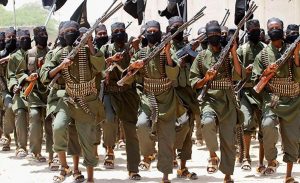The Stream - Monday September 5, 2016
by Saagar Enjeti

Al-Qaida's long-term strategy to outlast the Islamic State poses a major threat to the U.S. in the years to come, experts told The Daily Caller News Foundation.
"Al Qaeda is intentionally operating below a threshold that would force Washington into a decision-making position," Katherine Zimmerman, a Research Fellow and Al-Qaida expert at the American Enterprise Institute (AEI) wrote in an email to TheDCNF. "Al Qaeda leadership most probably directed groups not to conduct directed, mass-casualty attacks against Western targets in order to prevent Washington from having to decide whether to act against al Qaeda."
The U.S. has conducted only a few strikes against Al Qaida in recent months, and President Barack Obama has galvanized the entire U.S. government's resources toward fighting ISIS. U.S. officials responsible for the fight in Syria hardly mention Al Qaida. The coalition the U.S. has assembled is even called the "Anti-ISIS" coalition.
"Al-Qaida has been pursuing a subversive strategy of trying to integrate itself with local groups," Bill Roggio, a Senior Fellow at the Foundation for Defense of Democracies, told TheDCNF. Al-Qaida's operations in Syria exemplify the strategy Roggio discusses. The group has focused on integrating itself with existing Syrian opposition groups and building popular support among local communities.
When Al-Qaida's Syrian affiliate began to draw the attention of the U.S. and Russia, it ostensibly severed its connections with the global terrorist group and rebranded itself. "The unprecedented move was formally sanctioned by al Qaeda's senior leadership," Charles Lister, a senior fellow at the Middle East Institute, notedin an op-ed for Foreign Policy after the separation was announced.
The move was likely an attempt to "create the image of being more moderate in an attempt to unify and galvanize and appeal to other oppositionist groups in Syria," Director of National Intelligence Eric Clapper told an audience at the Aspen Forum in the days after the break was announced. Al-Qaida's leadership sanctioned the break, because opposition groups inside Syria can now partner with Al-Qaida, without also taking on all the baggage an alliance with a terrorist group brings.
The Institute for the Study of War (ISW) noted that Al-Qaida's ties to its group in Syria were the "primary source of the opposition's resistance" to a grand merger. This grand merger has led a coalition of jihadi groups leading a massive battlefield offensive against the Assad regime in the city of Aleppo. The jihadi-led coalition achieved a major victory when it broke the siege of Aleppo city on August 7.
The U.S. has played no role in the current battle for Aleppo, and its strategy is geared to taking territory away from ISIS.
"Al Qaeda has filled the breach left by the absence of the United States," a group of analysts from ISW, AEI, and the Center for New American Security wrote in an op-ed Thursday for Foreign Policy. The analysts warn that "the United States risks losing the war against extremism in Syria if it continues to allow Ahrar al-Sham and Jabhat Fateh al-Sham to be seen by the Syrian people as the victors in Aleppo." Ahrar Al-Sham and Jabhat Fateh al-Sham maintain deep ties to Al-Qaida.
Syria is the most fertile battleground for al-Qaida's vision of a truly Islamic state. Roggio explained that Al-Qaida believes ISIS declared the caliphate too early. He continued that al-Qaida's subversive strategy is geared towards creating the preconditions necessary for the caliphate’s declaration.
While Syria is the most active battlefront for Al-Qaida, Zimmerman highlighted that the group is pursuing the same strategy on other battlegrounds. Army Gen. Joseph Votel, commanding general of the U.S. effort against ISIS, has been trumpeting the impending defeat of ISIS in Iraq. Votel told reporters Tuesday, "We've got good momentum going," elaborating "We are really into the heart of the caliphate."
The U.S. has however made no indication of its plans to deal with al-Qaida on the Iraqi battlefield. Zimmerman cautioned "Al Qaeda is prepared for the day after ISIS in Iraq," elaborating "Al Qaeda just called for Iraqi fighters to answer its call and for Syrians to support Iraqis to reorganize their fight." She also pointed to continued low profile Al-Qaida insurgencies in Africa, Yemen and Somalia.
"Al Qaeda is a greater long-term threat than ISIS because of its resiliency," Zimmerman closed.
Follow Saagar Enjeti on Twitter. Send tips to saagar@dailycallernewsfoundation.org
Copyright 2016 Daily Caller News Foundation
Read More Here
No comments:
Post a Comment